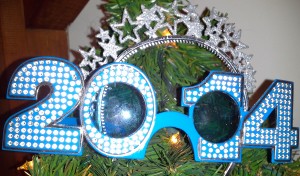 Happy New Year!
Happy New Year!
Once again, I watched the Times Square festivities from a comfortable, warm couch. The television showed thousands of people dancing the minutes away until midnight. The music was pumping loud and rhythmic. The crowds looked energized and focused toward the deadline separating old from new. As excited as everyone seemed, though, the music at the stroke of midnight turned nostalgic and almost wistful. While I drifted off to sleep (the first activity to bring in the new year for me) I started thinking about the mixed emotions that surround wanting to move forward and wanting things to stay the same.
I think most of us who love, or care for, or work with little children experience this ambivalence keenly almost every day. We celebrate the milestones and markers showing how our children are growing. But there is often a tinge of regret in remembering the softness of the newborn, or the delight of a child snuggled in our arms. I remember as a young mother feeling a bit annoyed that just when I figured my kid out, they went and changed!
 In my weekly grownup/child music groups, I consistently see this push and pull between the child’s need for care and their drive toward independence. The parents and caregivers often wrestle, as did I, with knowing how to respond to this ever changing little person. Nowhere in the whole music experience is this more clearly apparent than when all of us stand up to move. Some children wiggle to be let down so they can freely march and run and jump. Some cling to Mom or nanny with their heads buried in a comforting shoulder. Grownups move between keeping a tight rein on their little one; and actively pushing them away. Most look to me, as leader of the music, to show them how to act. This is the point where I have learned to say “Relax! This struggle between staying put and growing up is the real work of development and the real work of parenting. You and your child will find the way.”
In my weekly grownup/child music groups, I consistently see this push and pull between the child’s need for care and their drive toward independence. The parents and caregivers often wrestle, as did I, with knowing how to respond to this ever changing little person. Nowhere in the whole music experience is this more clearly apparent than when all of us stand up to move. Some children wiggle to be let down so they can freely march and run and jump. Some cling to Mom or nanny with their heads buried in a comforting shoulder. Grownups move between keeping a tight rein on their little one; and actively pushing them away. Most look to me, as leader of the music, to show them how to act. This is the point where I have learned to say “Relax! This struggle between staying put and growing up is the real work of development and the real work of parenting. You and your child will find the way.”
So here are some pointers for using movement as metaphor for healthy early development and some music suggestions from You and Me Makes We: A Growing Together Songbook.
- Create strong musical elements in the music you choose for movement. We know that rhythm and meter can motivate and help regulate movement. Try marching to 2/4 or 4/4 and running in 6/8. I like dotted rhythms for jumping. This will help the child explore and experience different ways their body can move and provide opportunity for choice. (‘Will You Come’, p.91)
- A clear melody will help structure the movement experience. This way both the child and the grownup can anticipate and prepare for changes. Melodies also are easily remembered so the movement experiences can be repeated at home. Repetition and practice are key factors in early learning. (‘Clickety Clack, p. 94)
- Developmentally, children will try to imitate movements very early on, but it takes a long time for them to get their bodies to actually do the motions. When they do begin to march or run or jump, it will generally not be synchronized to the music. That is how development works. Research shows that the brain is actively involved even when a child is just watching others move. Respect active watching and listening as a valid musical response. Give the child space and time. (‘I Can Move Around’, p.92)
- Use live child and grownup made music so that matching movements in the music happens immediately
in the moment. This shows the child that they are an important part of the world and creates an atmosphere in which the child can internalize a strong sense of self. (‘Jumping Up and Jumping Down’, p. 96) - Celebrate with the child and grownup as they find mutual joy in movement. Remind yourself and all grownups that the process of growing up is most important, and the work of a lifetime. (‘Pick Your Hands Up High’, p.93)
 So just as time marches on, we can give our kids a chance to march into their lives knowing that marching generally means they will be moving away from us. That is how development goes! Celebrate moving and marching on.
So just as time marches on, we can give our kids a chance to march into their lives knowing that marching generally means they will be moving away from us. That is how development goes! Celebrate moving and marching on.

Speak Your Mind